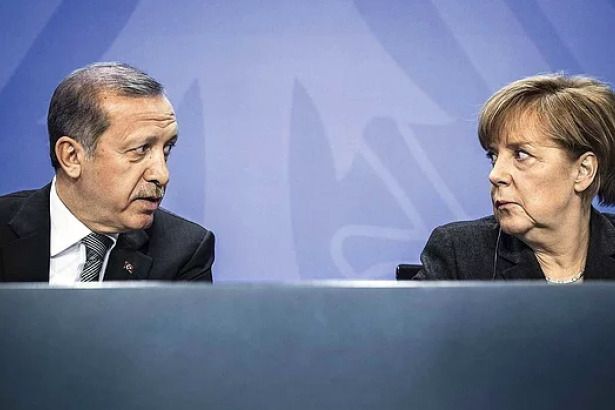New fronts in democracies of filth – Berlin flips of Islamist Ankara and vice versa

Finally, the German Federal Minister for Foreign Affairs, Sigmar Gabriel has made Ankara an official visit and declared that the German soldiers, as well as the Tornado planes, would have to be withdrawn from the İncirlik Air Base, that they were a “parliamentary army” and that this should be taken in stride. Of course, also adding that the good relations with Ankara will remain. This actually is a rapprochement.
How else could Berlin and Ankara reconcile? If German deputies could have visited the German soldiers in İncirlik, would the immediate transfer of Turkish citizens applied for asylum in Germany, especially the high-ranking NATO officers who are claimed by Ankara to be members of “FETÖ” (Fetullahist Terrorist Organisation, led by US-based preacher Fetullah Gülen, a mastermind of the July 15 Turkish coup attempt), take place in return? It is implausible.
Both parties well know that the problem is not the visit to the German soldiers in a military base by German parliamentarians. Statements such as “the German army is a democrat, parliamentary army” has no meaning other than calming the German voters three and a half months before the general election and reuniting the German political class against the “Erdoğan bogey” (Turkish President Tayyip Erdoğan) which they had created once upon a time and now transformed into a hate figure. The visit problem could have been solved without the incident becoming much bigger. However, the difference between Turkey and the “German democracy” thus happened to be shown once again. The Western values were always on the front burner and the “leader” Berlin was defying the “despotic Erdoğan regime” on behalf of the European democracy. But it was also not breaking the ties with Ankara. Such a message. Just one among the many messages.
The question is this: There is no such unrivalled “superior mind” within the imperialist system whose every desire is fulfilled. On the contrary, the truth is that great powers cannot bleed the small ones without stepping on each other or even making war. So, there is a constant and deepening “superior crisis” which crushes and ruins the dependent countries (weak links). This is an “artificial balance” that is continuously broken and rebuilt. The imperialist system can sustain itself in this way. However, the consequences of the frictions on the higher levels shake the relations between Turkey and its long-standing master, especially in economic space, Germany. Influentials of the imperialist system, who, ever since the Yugoslavia, have to subvert all the structures settled in the region (“politics of particles”), cannot agree on a common roadmap. Imperialist mechanisms prevent reconciliation. The crisis deepens. The system attempts to finance the crisis by shrinking the existing political units, or the largish countries, and by deindustrializing, ethnicizing and sectarianizing them and transforming them into a mafia-style commercial storage. Its reflection on Turkey is very distinct from other “peewee” countries.
Both rightist capitals are in need of opposing shows of force in order to strengthen their own masses and political classes. Doesn’t the “leftist Syriza” in Greece do similar things? It was necessary to defy Berlin, who let on that they were to play the Kurdish card from then on, to calm down the public opinion in Turkey. At least a sham reaction was tabled. And the İncirlik plane withdrawal operation happened to be the response of Berlin.
We may draw some early conclusions from these frictions.
First: No one can claim that the staff which will be withdrawn from İncirlik will stay in Jordan forever. Erbil or another new Kurdish state – it appears that there are at least three new Kurdish state cards in the drawers of imperialism; they can also be the new landlords.
Second: It can be said that Berlin and Islamist Ankara believe that they will reap a profit from this last friction. The fact that there won’t be any financial sanctions imposed on “anti-democratic Turkey” is somewhat connected with this.
Third: Erdoğan’s Turkey is an internal politic problem of Germany. Islamists of Ankara has realised it fast. They have started to set all the games, including blackmailing, on this balance or imbalance. Berlin fears that a population of over three million people of Turkish origin can get into motion to upset the balances of Germany. But the same Berlin has also seen that a strange Erdoğan hate has expanded in Germany in the recent months. The vast majority of German voters’ hate against Erdoğan’s despotic methods is a sort of fuel to Berlin. Because, not only the mainstream media and the hard-boiled political class, but also millions of common voters think so. Berlin wants to use this spreading reaction. But Ankara, too, chases a similar “disgust” against Berlin in Turkey. This unsteady balance (“artificial balance”) is aimed to be maintained without breaking the ties.
The fourth matter is a cause or effect of the third: Turkey’s ruling AKP (Justice and Development Party) has understood that it can intervene in Germany, which it has started shaking like an element of internal politics, as a kind of AfD (Alternative for Germany). It is an external right-wing populist movement and we can call it “AfD (External)”. It can be observed that the German mainstream political class has started presenting Erdoğan and his party to the German voters as a form of AfD, but is avoiding such a label.
On the stage, there is a filthy game for which our working people will pay the price or a “boatmen’s fight” that can evolve into large conflicts at a stroke. For now.




